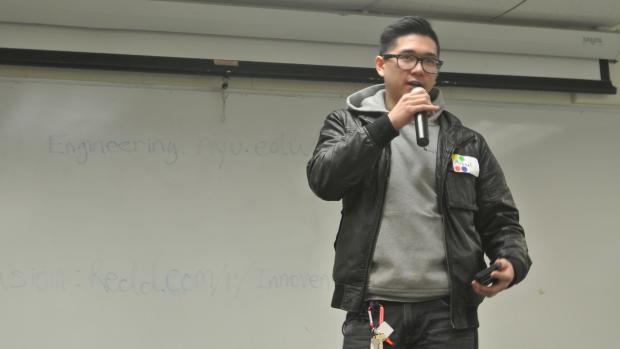Where Technology and Originality Assemble
The Inno/Vention competition offers students the chance to pitch prototypes to investors.

Are you looking for more chances to work interdepartmentally with other students? Do you have a great idea but don’t have the team or funding? The Inno/Vention competition offers students opportunities to form teams, perfect prototypes, and earn the chance to pitch your plan to investors.
Inno/Vention is an annual competition, hosted by the NYU School of Engineering in conjunction with NYU Incubators, that invites students to work together in teams to ultimately create business-minded, original hardware and software.
The first in a series of Inno/Vention events, the Team Hunt and Kickoff, gave students with ideas a chance to pitch to their peers in order to form teams of four members—the number needed to advance to the next round. Each team must include School of Engineering students, but non-students as well as students within the broader NYU community are allowed to be part of the teams.
The needs of each project run the gamut of engineers, designers, and programmers. Further events include the Power Pitch (to validate initial ideas), Making the Cut (when resulting prototypes are showcased and judged), and Demo Day (when the final teams will pitch their prototypes and business models to investors). These events are designed to whittle down competition, concluding with only three teams making it to the final cut and the chance to be awarded an investment deal.
This first stage of the competition, however, saw nearly 30 pitches thrown. Steve Kuyan, Associate Director of NYU Incubators, explained to participants what the competition entailed and dispensed valuable advice to those about to pitch. “You may not realize it now, talking to random people. You could very well be forming teams that could win the competition,” said Kuyan. “Don’t kind of do it, don’t sort of do it. Either do it, or don’t. Make sure you’re invested in what you’re working on.”
The early Inno/Vention concepts varied widely and included such life-altering devices as low-cost and lightweight prosthetic limbs, an implant under the skin to count glucose concentrations, and a reengineering of personal protection equipment for construction sites. Other ideas, such as a Yelp-inspired bathroom rating app and better eye recognition and tracking apparatuses for virtual-reality hardware, would advance technology and improve lives.
These technological solutions almost always specifically require the assistance of computer science majors who have the capability to code, engineer, and design the prototypes. One such design—in which users employ their hand as a mouse instead of using the conventional mouse hardware—requires those who specialize in computer hardware as well as motion-detection software.
Another idea—reduce environmental impact by creating an online platform connecting buyers and sellers of industrial waste in order to make a market value for an often-overlooked commodity—can only be taken to the prototype phase with the assistance of front- and back-end programmers and designers. This competition is perfect for those studying computer science, to hone their skills working on innovative, unusual ideas.
Although the competition is fierce, with only a small percentage of teams making it to the last stage, the lessons learned on the way are invaluable. Each step in the competition is a chance for students to perfect the art of explaining ideas and concepts well—from attracting team members to ultimately polishing a business plan to entice investors. In the Kickoff events, students must explain their ideas in a quick elevator pitch to a room full of peers—perfect practice for the competition as well as for any future endeavors.
Faculty members mentor teams that continue to the prototyping phase, helping students develop the best draft possible. The School of Engineering offers prototypers “a huge suite of products,” as described by Kuyan—the necessary software, materials, and lab time to complete the project.
The competition also hosts plenty of other events that allow the students to practice or learn necessary skills along the way, such as opportunities to practice their pitches and workshops on the basics of ventures and fundraising.
Events are free and open to the public. More information is available here.




